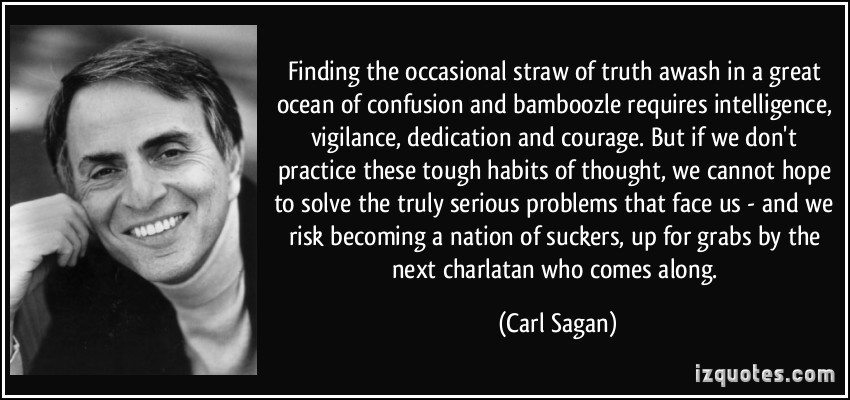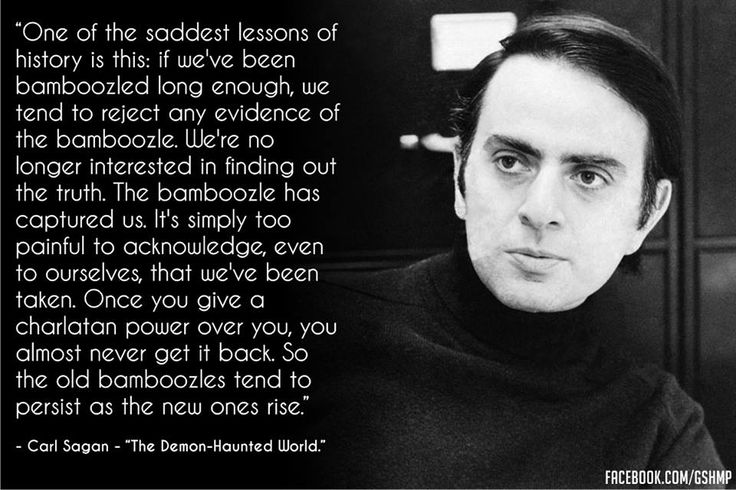Carl Sagan viewed the Confidence Trick, or Bamboozling, as an important concept. It is. And not just because it explains why people goose step behind dictators, superstition and other insane ideas. The basic mechanisms behind bamboozling also explain not just the problem of Free Will, but how the mind itself arises.
Paraphrasing Carl Sagan in The Demon-Haunted World: Science as a Candle in the Dark:
One of the most alarming meta-lessons of history is this: If we’ve been bamboozled long enough, or spectacularly enough, we tend to reject any evidence of the bamboozle. We’re no longer interested in finding out the truth, we can’t even find the truth. The bamboozle has captured us. It’s simply too painful to acknowledge, even to ourselves, that we’ve been taken. It’s best to ignore it, to reduce our pain. So we ignore it. Once you give in to a charlatan, or to madness, it’s very hard to get common sense back.
In practice, it’s even worse. Charlatans reign through institutions. If the institutions have been themselves bamboozled, the effect is much amplified. This is what happens in places such as North Korea. Hitler is a famous case. Again and again, in history, obvious charlatans bamboozled their subjects into extinction.
Other cases are closer at hand: the much celebrated North American educational system is still trusted. Yet, it is the Trojan Horse of plutocracy unleashed. Higher education is so expensive that only a small percentage of the population can afford it for their children, without crushing debt (tuition in the top universities is above pre-tax median family income: $54,000 at Harvard). It’s bamboozling on an Academic scale.
Recently the Wall Street Journal revealed that, after spending more than six figures paying for an education, learning to fly, “airline pilots face a new danger: minimum wage”. Great bamboozling at work here.
Don’t worry: the owners of the airlines are making a fortune, and a galaxy of profiteers make good money from the so called private universities, be it by just exploiting their sport franchises.
Why do we react to bamboozling with denial?
It’s in the nature of neurology. It’s a case of colossal mental inertia, intrinsic to the nature of minds.
Neurology, whatever its details, is something built from the outside. The environment determines its nature. However, once a neurology is built, it’s built. The environment, in the past (that’s where the connection with Free Will is) has built it. In the past.
A neurology is not build like a software program. An incarnated neurology is built like a dam: once it’s built, it’s built. If rain does not fall anymore, and the lake dries up, the dam is still there.
Neurology is not just very hard to change. It is made for this environment that built it. If the environment changes, the changed environment cannot rebuilt it from scratch, for the simple reason that it already exists.
A mind is as a sand castle. Once it has been built, and the builder, the environment, changes, or moves away, it stays behind, and decays. It’s the simplest observation, it has momentous consequences.
Intellectuals, paradoxically, tend to be bamboozled, because they are often too busy with the mental task at hand, to become more than a cog in the machine (some have revolted: the most famous example was Sakharov, a great Soviet physicist who helped built the H Bomb, but then turned against his masters with devastating efficiency.)
I have been bamboozled personally more than once, big time, typically by large, honorable scale institutions, and the small critters that serve them inside, like bacteria in termites’ guts.
Once we have been taken by some confidence trick, can we rebuild our minds enough to reject it?
True, one has demonstrated in experiments on mice, that neurogenesis is necessary for learning, and happens at all ages. So neurogenesis, the fabrication of neurons is always active. Maybe we could use that to rebuild our minds?
No. Most of the brain has been established long ago, during youth. One may be able to change the details, it’s much harder to rebuild a functioning machine, than to make it from scratch.
Is there a way to mitigate the ease with which one can get bamboozled? Yes. To learn to take one’s knowledge and certainty, with a grain of salt. To practice the “WHAT IFS”, systematically. To teach the mind the yoga of doubt. Any sure thing that can be bent, should be bent, with “What Ifs”.
It’s not easy to learn this meta-learning. Systematically not just what is true, but why it is true (why the alternatives have been ruled out) ought to be taught. (Some say there is no time for this, but then children are taught only half a day, and often in too boring a fashion. Exposing children to “What Ifs” makes it much less boring, because that’s what our neurologies are made for.)

The yoga of doubt can even be extended to the realms of emotions. Emotional geometrodynamics is actually one of the interests of sports. Many sports involve states when one is at war. Even somebody who dives in apnea has to fight. Against her, or his self, when they desperately want to breathe. Going to war in normal society is not just abnormal, but discouraged. In sports, it’s encouraged.
However, some of the most pervasive Confidence Tricks are not just made possible by denial, as Carl Sagan says. Denial is what they sell. Take Christianity (or Islam). What the Christian institutions sell is an unbelievable story, yet, if one believes in it, it’s most comfortable. All we have to do is be good, and believe (that the Confidence Men and their sacred texts tell the truth). Then we will be rewarded.
There is no more struggle: submission is the key to heaven, and if we die, alleluia!
Thus life can be experienced as a happy dream, or torpor (as Marx noticed). However the Con Men (= Confidence Men”), in particular the Plutocrats, can rarely find a balance of exploitation. So at some point, the dream turns into a nightmare. The dam breaks, the sand castle is wiped out by a tsunami, and the great passion of revolution sweeps the land.
We can’t just cultivate our garden (whatever Voltaire said). When the wave comes, all gardens get washed away; we have to run. Given enough time, the wave always comes, and washes civilization away. Right now it’s just washing the biosphere.
Although the destiny of humanity is not clear. However, passion, in practice, is all the destiny we need. Yet not all passions are good. Passion for violence has to be diverted (hence the obsession with watching team sports, war by proxies). But passion for truth ought to be indulged in ever more. Be it just to save the biosphere.
Patrice Ayme






